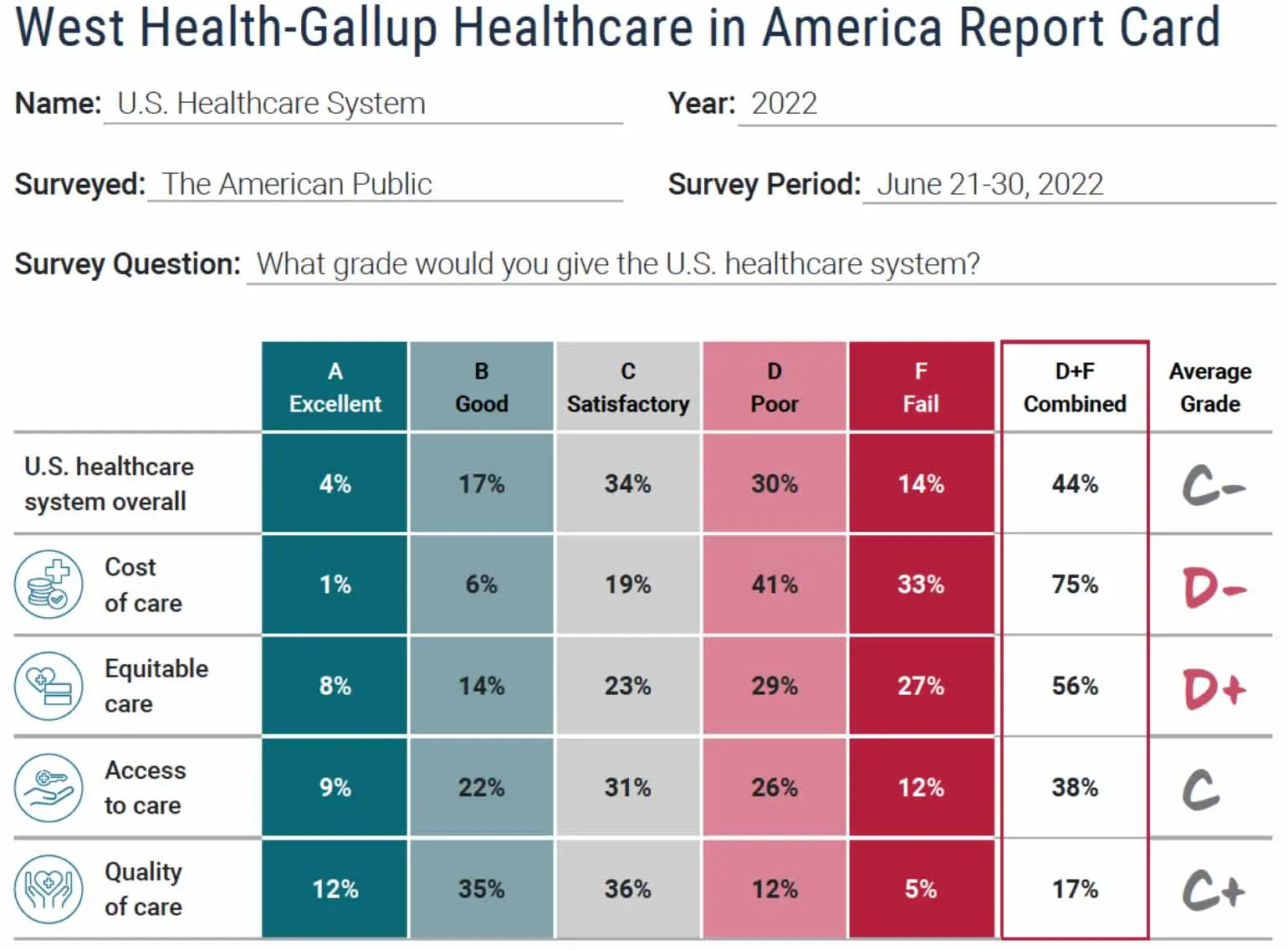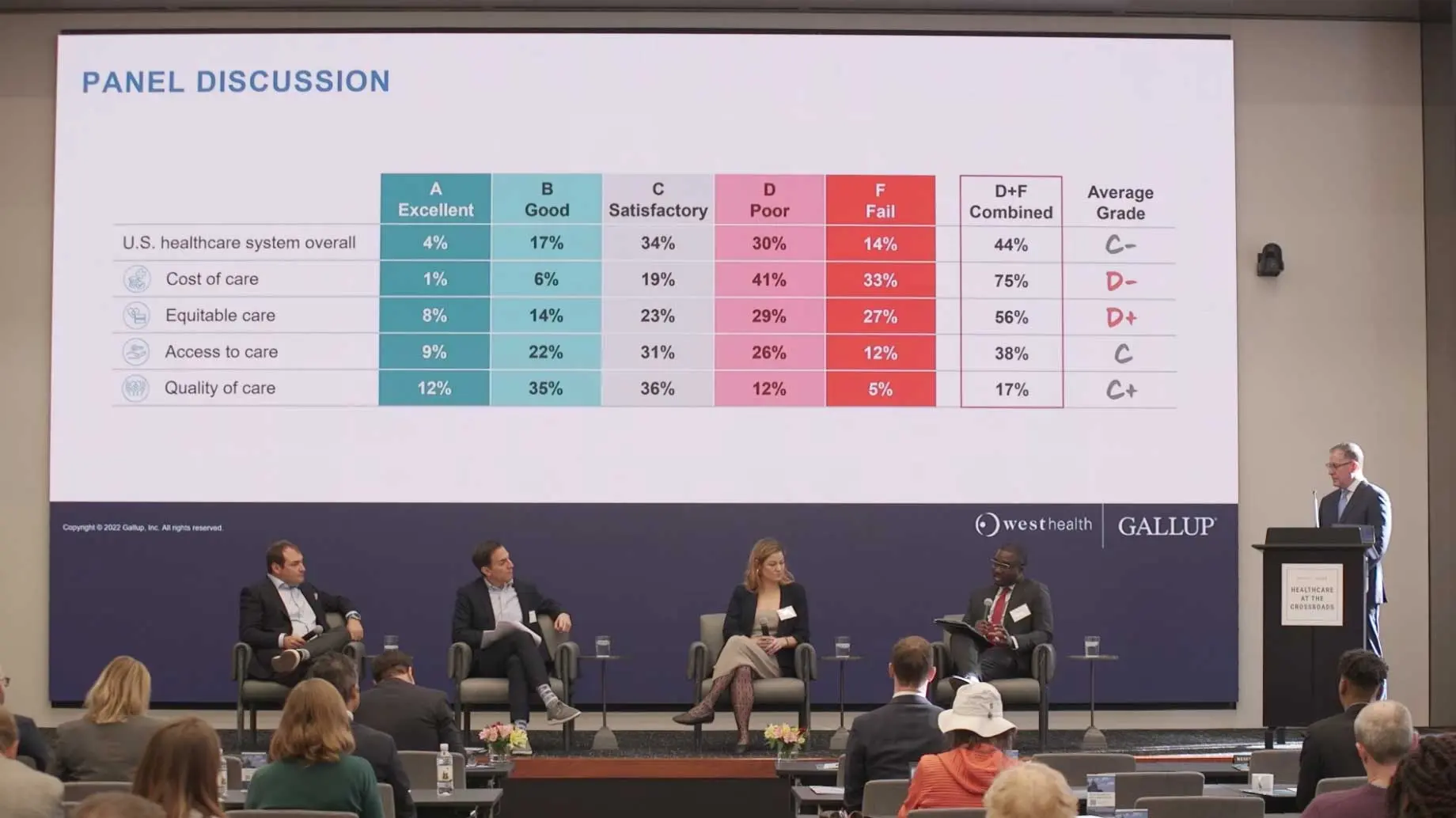West Health Informs the Debate on Healthcare Costs

Healthcare in America is at a crossroads. Steep price increases and the perceived inability of the quality of care to keep up with the cost have contributed to an all-time low D- rating for the U.S. healthcare system.
In 2018, West Health and Gallup teamed up to uncover and track perceptions of the U.S. healthcare system to identify what's working and what's not, give a voice to patients and those who care for them, and educate the broader public and policymakers on what's needed to radically change the way care is delivered.
By developing the largest survey in the U.S. on the cost of healthcare, West Health and Gallup are able to understand how Americans are interacting with healthcare and the burdens they face.
By partnering with Gallup, West Health spotlights the experiences and opinions of the American people via rigorous survey methodology that accurately details Americans' issues with healthcare affordability and its correlation to successful aging. Our ongoing partnership emphasizes solutions that the public supports and highlights a path toward achieving necessary change.
27%of adults -- representing about 70 million Americans -- report that if they needed access to quality care today, they would not be able to afford it.
Nearly 1 in 5Americans report they or a member of their household have had a health problem worsen after being unable to pay for needed care.
Championing Public Policy Decisions
West Health is a family of nonprofit and nonpartisan organizations focused on lowering healthcare costs to enable seniors to successfully age in place with access to high-quality, affordable health and support services that preserve and protect their dignity, quality of life and independence.
As West Health focused on their mission to lower healthcare costs and enable successful aging for seniors, they recognized the need for a credible thought leader to educate the public and policymakers on the state of American healthcare. To satisfy this need, West Health partnered with Gallup to help amplify its mission and become a leading voice in the debate.
This partnership has allowed West Health to become a champion in informing public policy decisions with research, expert analysis, and evidence-based education and outreach.
Understanding that healthcare has implications for all Americans, West Health's efforts have also allowed wider demographic representation within healthcare and provided necessary insight into experiences across race, age and region.
Establishing a Trusted Source in the Ongoing Crisis
By combining deep experience and expertise in healthcare and healthcare reform with Gallup's reputation as a trusted, impartial source for public opinion, West Health knew it could unveil high-quality insights that would garner attention from American policymakers and top-tier media -- but they recognized it would require a new approach.
That new approach began with an extensive data gathering process to present the most accurate information on the growing cost of healthcare and how it affects Americans.
Nationally Representative Samples
The West Health-Gallup first-year study was conducted using the Gallup Panel, interviews with healthcare industry experts and a nationally representative survey of more than 3,500 randomly selected adults. In the second year, West Health and Gallup used "pulse releases" to be more responsive to the changing public health situation. The study continually found sobering truths about public perceptions of healthcare and the burden and fear the current U.S. system creates.
In the third year, a nationally representative sample of more than 5,500 Americans showed that a large number of Americans across the political and socioeconomic spectrum continue to feel that healthcare is simply too expensive.
West Health also worked with Gallup to create compelling communication about these findings to inform policymakers, media and the American public.
Report Card
Together, West Health and Gallup developed a healthcare "report card" that allows exploration of the importance of healthcare for all Americans and shows correlations between emotions, high healthcare costs and the consequences of cost perceptions on individual health.
The scorecard allows consistent tracking over the coming years and highlights areas that need immediate attention and improvements. The significance of West Health's findings has been so influential in large part because of their development of the scorecard -- which has achieved West Health's mission of generating major conversation in the public and policy world.
This approach has been so effective that it has secured widespread coverage in media outlets, including CNN, The Washington Post and ABC News. An article from The Washington Post cites the West Health and Gallup collaboration in their effort to address the long-term healthcare crisis in the U.S., quoting The U.S. Healthcare Cost Crisis report finding that seniors have withdrawn an estimated $22 billion from their long-term savings to cover healthcare expenses.

By ensuring the numbers are representative of all American people, West Health has also revealed distinct inequalities in healthcare. The findings show clear evidence of the concern Americans have about healthcare costs and the large gender, age, ethnic and socioeconomic differences related to cost, equity, access and quality.
44%of women give U.S. healthcare a D or failing grade for access to care.
41%of Hispanic adults aged 50-64 say cost is extremely important in determining if they would follow the recommendation of a doctor for a procedure or medication.
Shifting Government Focus to the American People
West Health's studies and release of the 2022 Healthcare in America Report reveal pervasive political, economic and social ramifications to the U.S. healthcare cost crisis. The results are particularly poor for older Americans.
One in three Americans over age 50 have forgone basic necessities such as food and over-the-counter drugs to pay for healthcare. Seventeen percent of those aged 50 to 64 consider healthcare costs a major burden for their household, and nearly one in three within this demographic are concerned about being able to afford needed medicine in the coming months.
While the results are sobering, West Health also offers potential solutions. Most Americans agree on key policy solutions to lowering the cost of care -- the research is also a call to action for government representatives who can choose to listen to lobbyists or focus on the voice of the American people.
As the conversation continues, West Health and Gallup will continue to shed light on solutions that Americans support and guide the way toward long-needed action.
"It's time to enact different policies. If we do, the healthcare system may find itself at the top of the class. If our elected leaders don't prioritize change, we will know whose side they are on, and voters may hand them a failing grade at the ballot box."
-- West Health-Gallup 2022 Healthcare in America Report
How can custom research like this come to life? Organizations can use Gallup's survey capabilities -- similar to the Gallup Pulse -- to pose unique research questions to a representative sample of U.S. adults, creating insightful discoveries that lead to meaningful conversations.
